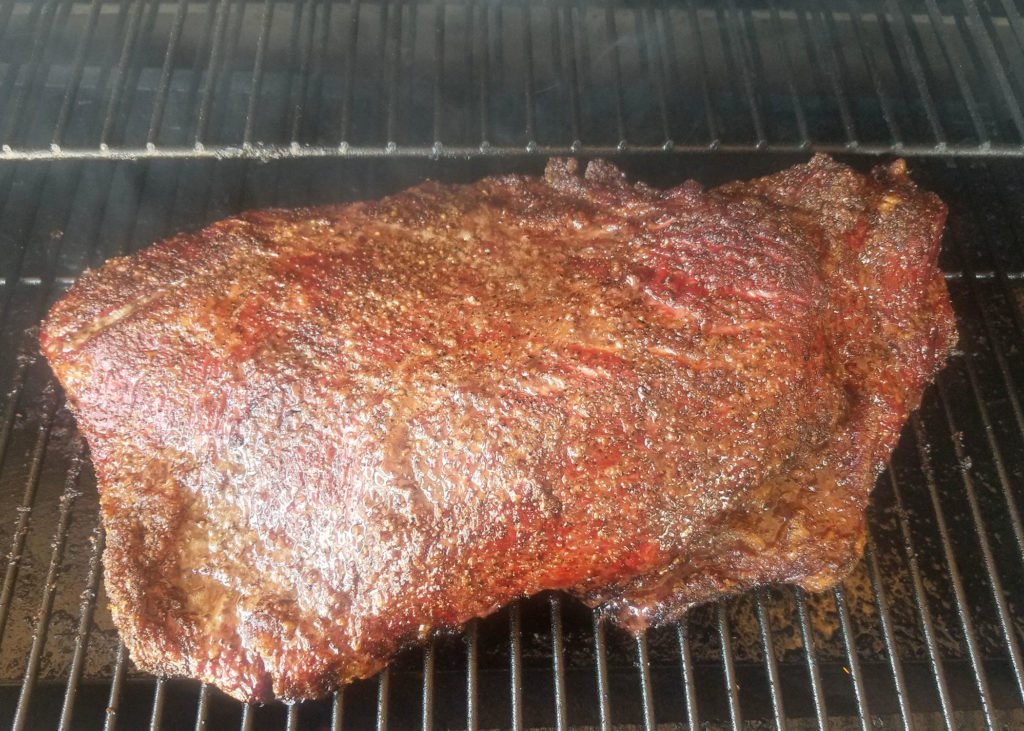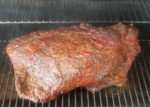
How to Smoke a Brisket
A brisket is known to be a tough cut of meat, but, when prepared with a little TLC and know how, it will be one of the best tasting and most tender things you will ever eat. In this section, I will teach you how to choose, prepare, and how to smoke a brisket, to achieve the best results possible.
Choosing A Good Brisket
There are two parts to a brisket, the flat and the point. The flat section tends to be leaner, while the point will have much more fat. The layer of fat on top of the brisket is the “fat cap” and should be white in color. The fat cap should be trimmed to about ¼ inch thick a little thicker is fine. Make sure the meat is a deep red color, which will represent freshness, and make sure there is plenty marbling throughout the meat, not just on top. The combination of the deep red color and the white fat of a brisket is called marbling, and it is the key to choosing a good brisket to smoke.
Do not choose a brisket that has been frozen. Frozen briskets tend to be tougher and dry out more during the smoking process.
Preparing The Brisket
Once you have chosen the perfect brisket, you will want to trim the fat cap to around 1/4/inch thick. A thick fat cap will not allow the smoke to penetrate the meat located underneath.
After trimming the brisket, sprinkle one side liberally with your favorite rub. Pat the rub (do not rub into meat) let sit until the rub looks moist. (approx. 15 -30 minutes) This allows the rub to bund to the meat. Flip the brisket and repeat on the other side making sure to get rub into al nook and crannies of your brisket. You can speed up this process by using a binder such as mustard or olive oil but this is totally at your discretion. Check out Easy smoked brisket for a free recipe!
Smoke Time
Place the brisket fat side up or down on the smoker. This shouldn’t matter unless you are cooking at a higher temp., then I would suggest fat side down to protect your meat.
I use a pellet smoker to provide indirect heat for outdoor cooking. And have found this method to be the best, but there are many more smokers available to choose from such as water smokers, propane smokers, charcoal smokers, and offset wood smokers.
I use mesquite pellets for smoking briskets. It provides a delicious smoke flavor, burns hotter so less wood is used. That’s how we do it in the high desert. Many people do not use mesquite, which is fine.
To achieve the best results, cook the brisket at 225 degrees for about 1 hour and 15 minutes per pound. Always use the thermometer to be safe. Many people believe that when the internal temperature of the brisket reaches 180 degrees, it is done. This is both true and false. When the internal temperature of the brisket is around 180, the fat in the brisket really begins to render. The brisket will maintain this temperature for a while, and this adds to the tenderness of the brisket.
The Finish
At this time, I like to wrap the brisket tightly in heavy duty aluminum foil until internal temp. is right around 202 degrees. Some people use butcher paper for the wrapping process to preserve the bark. I have not used butcher paper yet, but I will test this method soon.
When your brisket is at your desired internal temperature. Remove from the smoker and let rest for at least 1 hour.
Slice, (always against the grain) and enjoy with or without sauce.
Note:
A great way to keep briskets moist before wrapping them is to use a spray bottle consisting of apple juice mixed with olive oil. This will keep the outside of the brisket moist and tender. It is important to keep the lid closed while smoking the brisket to reduce heat loss. So I spritz the brisket with the apple juice and oil about every 60 to 90 minutes.
Click on Recipes to see what else is cooking.

[…] If you need a little more detail on the smoking part of this recipe Click How to smoke a brisket. […]
[…] Another factor to consider when choosing charcoal is burn time. Lump charcoal burns hotter and faster than briquettes, making it ideal for high-heat grilling or searing. Briquettes, on the other hand, burn longer and more consistently, making them better suited for slow-cooking or smoking. […]